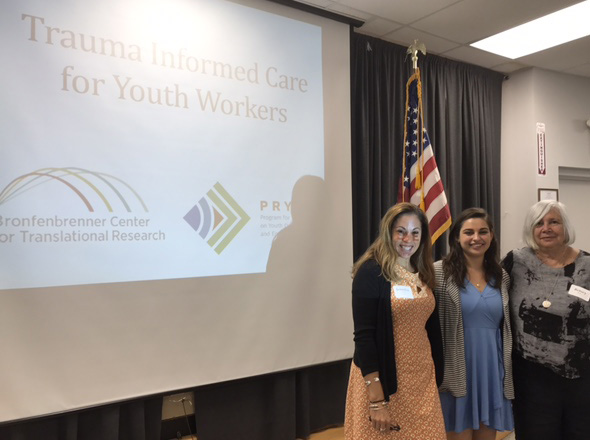Research informing practice to care for traumatized youth
Julia Lesnick, PRYDE Scholar
This past summer, I received a grant through Cornell Cooperative Extension to create and facilitate a training on trauma-informed care for providers working with youth in Binghamton. This was a truly unique opportunity for hands-on service learning. At each stage I applied the information I learned as a PRYDE scholar to navigate the challenges of program design, collaboration, evaluation, and implementation. Throughout the process, I was aware that these decisions and outcomes would have a direct impact on the community. My strategy was to start with the community’s goals and use their input to direct the program design, and then use my training in youth development research and methods to create accessible, applicable tools to meet their trauma-informed care goals.
The most incredible part of the whole experience for me was seeing relationships form between participants, the content, and myself during the training. Specifically I saw shifts in energy, engagement, and connection as:
- Youth workers related to each other over shared challenges and exchanged tips for working with traumatized youth.
- We each connected the training’s content to our own work and started to take ownership of the new knowledge, seeing how it will benefit the youth we support.
- Participants expressed their trust in me as a member of the community who cared about their needs and could be a reliable source of information for change, while I communicated my intent to learn from their wisdom, and that I valued them sharing their experiences.
My mother and grandmother attended the training. They always taught me that when you witness people who can’t access the care they need, you invest your shock and disbelief into supporting social services.
One particular moment where this wonderful relationship building really took shape was when we started to discuss the impact of trauma on the brain. While most participants had seen the behavioral and emotional impact of trauma on youth, only a few were familiar with the neurobiological consequences of trauma. Learning of trauma’s influence on neural development is often intense, or even shocking, and this information had perceptible impact on the attendees. Training participants seemed to connect the dots between behaviors, emotions, thoughts, and relationships that they had experienced with traumatized young people. This knowledge reframed their understanding of a young person with trauma history, explained many of the challenges and barriers in working with them, and also indicated the strengths and differences that affected youth bring with them to youth programs. In this moment I saw how research can foster hope for resilience and recovery as it enabled attendees to imagine adjustments in their personal practice and envision connecting in new ways to youth and co-workers. From there the participants, the content, and I moved forward to build relationships with each other, the information, and ourselves to make change in our community.



